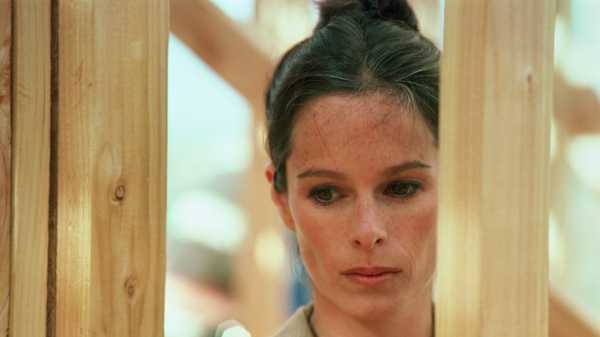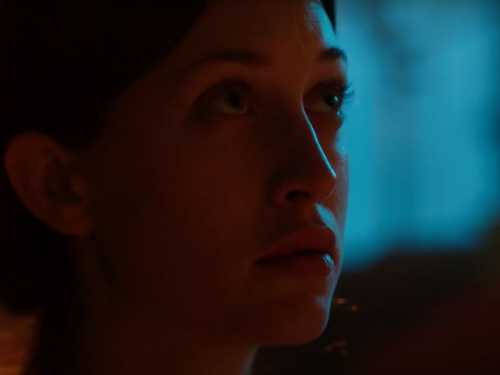
Hollywood sneaks exemplary works of audacious modernism into plain sight at the multiplex. Some of them boldly trumpet their filmmakers’ ambitious artistry (think of David Lynch), but others arrive (and often depart) far more modestly. One such secret masterwork, Alan Rudolph’s 1978 romantic melodrama “Remember My Name,” never reached the mainstream. Despite a cast that features Geraldine Chaplin, Anthony Perkins, Alfre Woodard, and Jeff Goldblum, it was scantly released and tarred with negative reviews; it is rarely screened, has apparently gone unreleased on VHS or DVD, and has remained widely unseen owing to the vagaries of the marketplace. Yet it’s one of the most unusual and original films from nineteen-seventies Hollywood, a decade of innovation and renewal. It’s a double display of the quasi-musical power of cinematic images and of the image-like authority of great music in movies. And now it’s streaming on Prime Video (for subscribers) and on Tubi (free, with commercials).
Rudolph, born in 1943, was raised as a Hollywood insider (his father, Oscar Rudolph, was a longtime assistant director of movies and a major director of such TV series as “Batman” and “The Brady Bunch”) and worked as an assistant to Robert Altman on “The Long Goodbye” and “Nashville.” Altman, who produced “Remember My Name,” was a myth buster, opening the doors of Hollywood traditions to the sharp winds of reality, whereas Rudolph (who’s seventy-nine) is an embellisher, endowing ordinary lives with the grandeur of cinematic mythology and the refined styles that go with it. “Remember My Name” is an understated, involuted film noir in coolly natural color, a drama of stark motives that give rise to delicately intricate surfaces. Not to put too fine a point on the matter, it’s the story of a stalker—albeit an unusually sympathetic one.
Chaplin plays Emily, who has just been released from a twelve-year prison term (I won’t say for what) and heads to Los Angeles to track down a construction worker named Neil Curry (Anthony Perkins). They were in a relationship before her incarceration, and Neil has no idea that she has been released. Emily’s effort to reconnect with him is a complicated, D.I.Y.-detective-like operation that begins with prank calls, advances to deft surveillance, and rises to anonymous vandalism, furtive harassment, intimidating intrusion, a caper of automotive aggression, and a trespass on the construction site where Neil works.
These menacing maneuvers are realized with no actual threat in mind—they’re only Emily’s effort to pierce the barrier of Neil’s atmosphere in order to reimmerse herself in it. Her meddlings are filmed with a gliding grace that highlights the pathos and the melancholy underlying them, as when Emily discovers that Neil is now married to another woman, Barbara (Berry Berenson). Moving with a cool, blade-like demeanor, Chaplin’s Emily conveys a quietly ravaged majesty as she carries the burden of her memory and the mighty force of her single-minded purpose with a steely yet balletic lightness. Rudolph doesn’t stint on the matching pain of Barbara, whose life is no less disturbed by Emily’s looming, lurking presence, and the fault lines in her marriage that it brings to light. Perkins, as ever, excels at turmoil in repose; he gives Neil the tension of secrets, as he hides his past behind a veneer that Emily’s return threatens to shatter.
Working with the cinematographer Tak Fujimoto, Rudolph, who also wrote the script, makes downbeat lyric poetry of seemingly infinitesimal actions. The images evoke vast inner worlds of emotion, the breath-holding beauty of reckless desire and of the meticulous moves that go into pursuing it, as when Emily lights a cigarette in a broken mirror and practices a steady walk—holding her cigarette aloft with a movie star’s bravado—in a new pair of high heels that she has bought in the hope of pleasing Neil. The director’s decorative virtuosity is spotlighted early on, when Barbara returns home from work and rushes into the house to answer a ringing phone. A single extended take, filmed from inside the house and through windows, shows the window frames, walls, doors, and furnishings as the car pulls into the driveway and she dashes inside, thinking that she’s alone, as indeed she is—except that the long-absent Emily, who’s placing the call from a pay phone, is a virtual presence in the house and imagining herself inside it.
For all his refined aestheticism, Rudolph perceptively sketches the social realm that Emily confronts, the political-power grid of society at large. Her manner seems alien, furtive, awkward; she chain-smokes cigarettes, extinguishing one between her fingers before lighting another, and seemingly speaks at, past, or even against others. Much in Emily’s demeanor—an aggressive defensiveness that suggests an ingrained, perpetual survival mode—evokes the violence of incarceration. She gets herself a job as a cashier at a discount store, where she has a poignant connection with the beleaguered manager, Mr. Nudd (Jeff Goldblum), who grudgingly hires the formerly incarcerated but never lets them forget that they’re under constant surveillance and suspicion.
Rudolph also discerns, through Emily’s experience, the tensions of racial politics, which are shown in connection with matters of class and gender. She brusquely and teasingly befriends a Black man named Pike (Moses Gunn), the handyman at the rundown apartment complex where she rents a ramshackle room. To get the apartment set up as she wants, she sasses and challenges him with a brazen blankness that makes even her vulnerability look like a scheme. Since Pike is a hard man himself, game recognizes game, and their relationship tightens with a slow, serpentine force that Emily controls. At work at the discount store, Emily taunts and defies the tough-minded, conscientious assistant manager, Rita (Alfre Woodard). Rita has clearly put up with plenty of guff from Mr. Nudd’s parade of sentimental hires (doubtless all white women) and she won’t take it from Emily. Yet the proudly disdainful and coldly rebellious Emily smashes in unbowed; the clash is inevitable, and Emily plays it for existential stakes.
Though the movie’s dramatic lines are clear and sharply etched, the images veer toward opacity, toward hard and flat surfaces (compressed by telephoto lenses) and visual flourishes so conspicuous as to stand in front of the action, even outside it. The movie’s main trope is the slow zoom in, which has the feel of a watch’s second hand ticking onscreen, conjuring urgency and a sense that time is rushing by at the speed of thought. In such moments, whether the dialogue is pithy or the action is speechless, the movie teems with its characters’ tumultuous and tangled inner lives. Moreover, “Remember My Name” has a soundtrack to match that image repertory: it has no traditional score, but, rather, is punctuated throughout by songs written and performed by the octogenarian blues singer Alberta Hunter (who had only recently resumed her career after working for twenty years as a nurse), accompanied by a notable group of jazz musicians.
The graft of external artistic elements that both belong to the fabric of the drama and comment on it, and the composition of images that are as dramatically central to the film as the action itself is, are cornerstones of cinematic modernity. Rudolph is, in effect, a filmmaker of the American New Wave, fusing his distillations of classic cinema with his observations and his personal artistic passions—standing simultaneously inside and outside, not vitiating the emotions or effacing the characters but extending them into extra dimensions, and doing so with the fervent sense of sharing his own pleasures, the joy of letting viewers in to see what he sees, hear what he hears. That sense of first-person wonder at the aesthetic whirl marks the many highlights of his career, including the Lost Generation drama “The Moderns,” and the New Yorker-rooted “Mrs. Parker and the Vicious Circle,” and the jazz-infused melodrama “Afterglow.” In “Remember My Name,” Rudolph’s personal vision gets its early, clarion exposition. ♦
Sourse: newyorker.com






